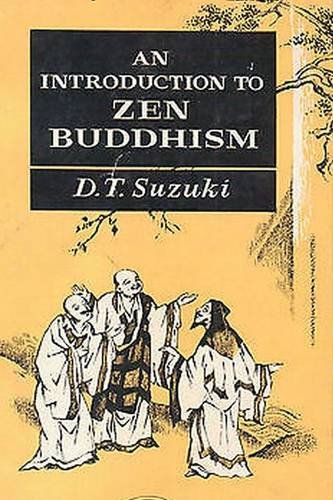


Full description not available
G**E
A genuine account of the Zen experience from someone who knows
This is a remarkable book for various reasons. First, as the author points out, it is impossible to actually explain the subject. It defies logic and philosophic reasoning - because satori brings a state which is beyond such reasoning.As Suzuki puts it, "...I am still fully aware that in the sense of satori what I say can only be useless. I could not resist, however, the attempt to maneuver our Western understanding at least into the proximity of an understanding - a task so difficult that in so doing one must take upon oneself certain crimes against the spirit of Zen."But don't let that admission put you off, thinking that another writer may have done better to convey the meaning of Zen. Despite this barrier of words, Suzuki does a remarkable job of somehow making the concepts real. He does this by repeatedly working it over and giving many examples including historical dialogues and deeds of Zen masters. The same approach has been taken by other writers including our western brethren, Carl Jung (who wrote the intro) and Alan Watts. But such writers never really make the grade because a) they have apparently never achieved satori, and b) they are still trying to support Zen with philosophical reasoning.To somehow circumnavigate the subject and make it accessible to us despite this barrier of language, Suzuki does a remarkable job of choosing just the right words, and even then he sometimes has to explain that a word or expression he has used is not really correct but is the closest available to the concept. Then, in the next few pages, attacking the subject from another angle and then another, until the reader, if he or she is not too dull, begins to see that there is a state there that just may be achievable, that the paradoxical statements (koans) are not as whacky as first perceived. Also, considering the essays are about 100 years old and can still be comprehended with reasonable clarity I have to compliment the translators.Another aspect which makes this book very appealing for readers is simply that Suzuki loves Zen. And, despite the difficulty, he very much wants his readers to grasp its facets and values and, if at all possible, experience Zen in the deepest way.Gary Judge - author of Understanding the Japanese: Insight into Japanese Culture and Thinking
B**G
Buy the paperback
The book is a classic if you are interested in Zen. But the hardcover version is nearly unreadable. The print is so thick that it’s very challenging and tiresome to read. The paperback is much cleaner and more readable.
T**G
Superficially lacking paperback, good content not for beginners ;)
I ordered the paperback (not mass market) and the cover image is quite clearly pixelated (poor quality image). The spine is plain white with nothing printed on it. None of this effects the content, which I am pleased with, but it will not be a beautiful addition to your bookshelf should you get the paperback.A word of warning, though, this book has many references (by the author) to Chinese, Japanese, and other historic information that is not for those with little or no background knowledge of Chinese philosophy. This is not a "How-to-Zen" nor does it give concrete definitions, but dances around the essence through origins and examples.I'm no expert, but I do have some varying background knowledge, without which I would be completely lost. Still, many references are tied to the time in which this was written.
I**S
Good intro to the Zen View of everything
The book is divided into several chapters which were originaly published as a single articles on several publications, but have a reworking that makes them easier to read. First a rather long foreword by Dr. Jung let us oversee the entire oriental vision of the world. Afte a short prelimiray done by the author, chapter two discusses on what is zen and what is not zen. On the third chapter the question of the supposed nihilism of zen is brought to the board. Then on chaper four an introduction the the logic (or ilogic) of the zen is done. Still, on chapter five the author reaches the partial conclusion that zen rather than a nihilistic and ilogical doctrine is a higher affirmation of the whole of the universe. On chapter six, a general realization of the practicity of zen (in contrast with other branches of buddism and christianity) is done. On chapter seven, the author try to describe the reaching of illumination or "satori". On chapter eight, author make an explanation of the aim and functioning of the so called "koans", which are excescies composed of brief cases that exposes the zen mind and logic further hard to explain and understand. Finally on chaper nine a short description of a monk's life in a zen monastery is done, to show up the central role of the "zendo" or meditation hall within the monastery.A brief reading that can be taken as an exelent introduction to the zen, highgly recomended.
D**I
Is Zen unexplainable?
The author seems to be very knowledgeable, but most of the the book was filled with, “zen is not like that, it is not like this, a zen master said this, …”. I was expecting to see basic philosophy, who practices them, where does one start to dive deeper etc. It appears Zen is really unexplainable. Atleast I did not understand from this book anything more than it us not like anything we know.
J**K
A book fit for thick thinking.
Will definitely have to regularly re-read this book.Nine ten eleven twelve thirteen fourteen fifteen sixteen seventeen eighteen nineteen 20.
P**.
Nothing Zen about it
After reading the book i felt depressed beyond belief. Nothing zen about it
J**S
A masterful quick read
D. T. Suzuki has walked a tightrope in this work. He intellectually engages the reader just enough to hold their attention but also keeps the atmosphere of reading almost poetic and fluid like in a way where the many examples of satori flow right along with his explanations and deeper insights like adding water to a flowing stream. Nothing is disturbed but yet something is added. I grasped something yet I left with nothing more than I came with. If you feel disappointed by this work, read it again but don't let your mind abide too much on this page or that. Let your mind be free, read the words like a dog drinks from a bowl. Simply take it in and feel it. Don't just stare at the words and make inferences. Let them flow through your consciousness.
C**R
An Introduction to Zen Buddhism by Daisetz Teitaro Suzuki
It's a joy to read this deservedly famous writer's introduction to ZEN.
Z**K
Its a great read.
Summary of this book is :1. Zen cannot be explained in words.2. Satori cannot be explained in words.With koans and utterings of masters scattered here and there, the book gives a great insight into trying to understand zem.Its a great read.
P**L
Five Stars
This is a must read for anyone looking into a Zen Practice
B**S
Muito bom!
O livro é muito bom, apesar de não parecer ser o livro completo, este ebook aparenta ser uma pequena parte do livro An introduction to Zen Buddhism, do mesmo autor , o qual na versão impressa tem o prefácio escrito por Jung.
G**O
Introduzione al Budhismo
D.T. Suzuky è uno dei massimi esponenti del Buddhismo zen. Questo libro è per chi vuole iniziare ad approfindire lo Zen. Vanno poi letti gli altri suoi libri ma cosa più importante è sperimentare gli insegnamenti del grande maestro.
Trustpilot
1 month ago
1 month ago